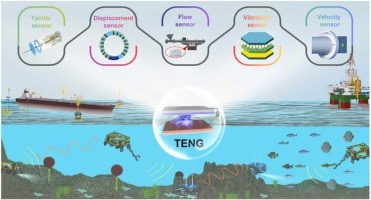Abstract
With the rapid advances of electronics/materials and manufacturing, marine sensors have made significant progress in the field of ship and ocean engineering, which could cater to the development trend of marine Internet of Things (MIoT) and intelligent ship. As the number of marine sensors increases and the range of distribution expands, developing a continuous, sustainable, and ubiquitous power source is critical for ocean sensing, but it is an unsolved scientific challenge. Marine self-powered sensing through triboelectric nanogenerators (TENGs) may be a promising approach to this emergency. TENG can efficiently convert mechanical triggers from the surrounding environment into electrical signals. It has the advantages of highly efficient mechanical-to-electrical energy conversion, self-sustainability, broad material availability, low cost and good scalability. This article reviews the working principle of marine triboelectric sensors and their applications in the field of ship and ocean engineering. They are mainly divided into five categories: tactile sensor, displacement sensor, flow sensor, vibration sensor and velocity sensor, involving their advanced structure designs, functional material innovations and marine application scenarios. Finally, we highlight the academic challenges and future prospects of these technologies, as well as the key points to be considered in transforming them into commercial applications.

